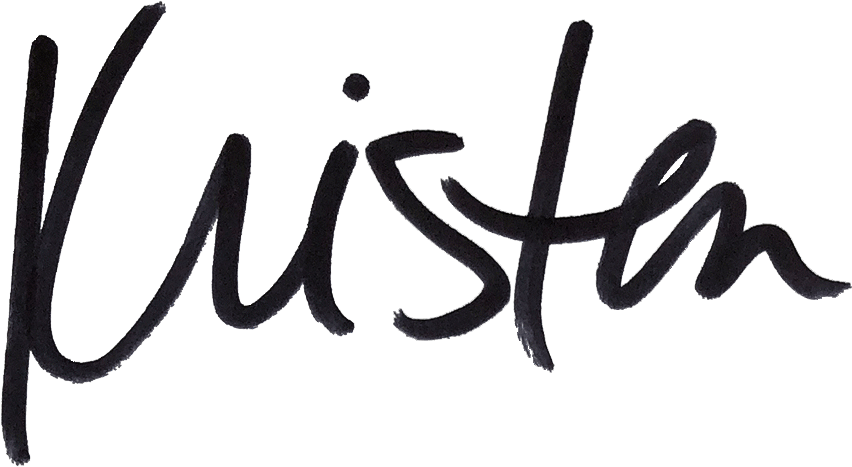Psst! This is episode 179 of That’s What She Said. You can listen in or keep reading to enjoy it!
I was at Trader Joe’s last week and my cashier looked STRESSED OUT. I said, “It’s busy, huh? Are people crazy today?” She glanced from side to side and then looked me up and down, as if making sure I wasn’t a Secret Shopper, before saying: “One lady yelled at me because she wanted a 15-pound turkey and hers was 14.9. I only have so much control over turkeys, lady.”
Over the past few weeks, I’ve also found myself asking questions to my KK on Tap peeps like, ‘When is your cut-off deadline?’ ‘When are you done working?’ ‘Are you slowing down in December?’
…and then realized that I couldn’t keep asking these questions without coming up with better answers myself. In an effort to slow down and avoid becoming the screaming turkey lady at Trader Joe’s, the podcast is on hiatus from now through January.
Here’s how I’m clearing the energy of the past year and planning for the one ahead.
I know, I know, the shiny AF super-planners that promise you’ll be organized, fit, meditating, and rich in 30 days or less have been for sale since October, and you’re still in the thick of things and don’t have time to reflect on anything except what to buy before you see your friend’s sister-in-law’s daughter, Stephanie, who you bought a gift for that one time and now you have to do it every year. (I suggest a Bob Ross Chia Pet. Every year. Done and done.)
We don’t do shame around here. There’s no rush on listening to or implementing any of this material. It applies any time of year, and it’s here for when you need it. Okay? Okay.
1. First: acknowledge everything.
This is stolen from Katherine North at Declare Dominion, and it’s just two brilliant questions that help you process a bunch of months all at once!
What are you proud of having accomplished this year? List 5 things.
Further, what did you come through? List your top 5.
We so often list our achievements as if they exist independently of what we’ve encountered, engaged with, conquered, finished, fixed, said goodbye to, or tried in any given year. But they don’t.
Asshole brain will always say you haven’t done enough and will make you think you haven’t survived much either, but those assumptions don’t hold up to even a tiny bit of inquiry.
When we acknowledge our Tiny, Annoying Progress as well as what we’ve straight-up survived, we honor the places where we’ve spent our energies wisely, and those places and circumstances that took our energies, too.
This year, I’ve survived losing beloved doggo Hermione D. Granger, adopting tiny pupper Aaron Neville Longbottom, having said 10-week-old puppy in the ICU for multiple days, sleeping 16 hours at a time for months on end because my thyroid took a hiatus from functioning, and improvising my way through paying SO MANY thousands of dollars in unexpected veterinary and medical bills.
…not to mention all the dollars I give to HBO, Amazon, and the people who make the most important things: pizza socks, unicorn bodysuits, and remote-activated bubble machines. Well, Bear bought me the last one for our kitchen, but you get the idea.
When we acknowledge the quite specific and often brutal working conditions we’ve survived, everything we’ve done this year seems AMAZING.
Plus, we’re all surviving the global rise of populism! 30% of the world’s population lives in a backsliding democracy! The 24-hour news cycle brings gloom, doom, and disasters on a daily basis!
We all get an extra 20 Achievement Points just for surviving 2018.
2. Get out your calendar.
Paper or digital, it’s fine. I can’t do a paper calendar because the feeling of being unable to cross an item off my to-do list is devastating, while dragging an incomplete task from one day to another on my Google calendar feels just fine. Thus, I use a digital calendar. You may be the opposite, or use both kinds, and I have no judgement about what’s better or worse except that having a calendar and a plan generally beats not having any sort of calendar or plan. (Related: here’s everything I know about time management.)
3. Add space and pleasure to your calendar first.
As you look at the next six months, play with letting space and pleasure take up blocks of time before anything else gets layered into your schedule. This is the total and complete opposite of what most people on earth do, which is why this single action is both powerful and rebellious. Instead of filling your calendar with to-do’s, work tasks, projects, and ideas, then squeezing fun into those 2 cold-ass days in February that remain, you can choose to prioritize time for pleasure in the coming year.
Pencil in vacations, birthdays, anniversaries, holidays, and/or days off before you add anything else to your calendar.
Reserve time in the form of crossed-off work days even if you don’t know where you’re going on that vacation next September. Making room is enough. Also: you don’t have to go on vacation to have time off! You can choose to stay home for a few days in March, or two weeks in April, or for a long weekend in May. Since you own the business, YOU make the calendar, and YOU can take as much time as you need to remain a fully functional human.
You don’t have to ‘earn’ time off. You deserve a weekend and a slower season whether you’ve crushed, nailed, cruised through, or just barely survived this year.
The world will not cease to rotate on its axis if you’re having a good time and you don’t work on Tuesdays. Promise.
I go one step further on the pleasure route and make a Depression Calendar, which is my personal antidote to those cold winter days when I’d rather do anything but leave the house. Scouring your town for events, films, festivals, gatherings, parades, and parties costs you only a few minutes and some nominal ticket fees. Maybe plan to do something truly unique after visiting Atlas Obscura and (searching your hometown)?
In return for this small investment of time, you’ll actually leave the house when it gets dark at 4:21 p.m. instead of sinking into the abyss of Netflix and delivery pizza for the duration of your Seasonal Affective Disorder.
Good planning can be the difference between looking out over a bleak emotional landscape and seeing a ton of things to look forward to on your winter calendar.
For me, it’s the difference between having a so-so winter and an absolutely devastating one. (If I manage to get a spectacular winter under my belt, you’ll be the first to know, and I’ll share every damn thing I’ve done in order to make that happen.)
4. Embrace the ways you actually use time.
Are you an achiever’s achiever? If yes:
You naturally fill every single moment with work if they don’t schedule offline time, down time, free time, and unstructured time. If you’re naturally attuned to being productive at all times of the day and night, schedule your days off before you plan your work days. Place some days, like Tuesday evenings or Saturdays, entirely off limits from work-related tasks. Finally, create clear start and end times for your work on any given day.
The boundaries around your time are to keep work from spilling into every aspect of your life and taking over your every relationship, including the one you have with yourself. Don’t let ‘busy’ crowd out your interior life.
Do you hate structure and discipline more than nearly anything else on earth? If yes:
You naturally fight structure. You feel imprisoned by the discipline of knowing what we’re going to do on any given day, so we keep vague to-do lists which never come to fruition. It’s taken years for me to realize that I actually have to schedule writing time, email time, work time, marketing time, administration time, banking time, and coaching time, or they won’t happen. (Also, setting internal goals is helpful!)
Schedule your work days with clear start and end times — holding a morning call or meeting can help assure you’ll show up on any given day! — so that you actually work through your to-do list instead of getting distracted by what’s urgent or shiny or both.
As you take a look at your to-do list, break every huge task on your calendar — i.e. ‘make a new website’ or ‘get 12 new clients’ — into much much muuuuch smaller tasks. The bigger the project, the more likely you are to have tons of tasks within it.
That initial breakdown of a huge project into small tasks can be a bit stressful, but choosing to get every item onto the calendar means you’re much more likely to finish the project, publish the website, launch the project, and/or sell the event. I’ll guarantee your asshole brain calls you a ‘flake’ when all you really need is a clear calendar and specific to-do lists for any given month.
The boundaries around your time are to make sure each work item or task is a.) on the calendar and b.) actually gets done. This keeps your truest work from getting pushed to an elusive ‘someday’ that never comes. It also keeps you from wallowing in the swamp of ‘OH GOD I DUNNO WHAT TO DO NEXT’ that can cost you weeks or months or years.
When you translate Enormous-with-a-capital-E tasks into smaller ones and add ’em to your calendar, you have a realistic grasp on how long any given project will take. This causes less stress about timelines, due dates, and deadlines. Translated: you can’t write a book in two weeks while selling your screenplay and raising your babies and cooking all the meals and working out for three hours a day and fighting a chronic illness, okay? Breaking your tasks down and scheduling them allows for realistic time expectations all around.
5. De-prioritize shit that doesn’t matter, isn’t working, or sucks your energy.
Identifying energy sucks can be just as vital to your calendar as getting all the planning, organizing, and ‘to-do’ing exactly right.
If you spent eight months working on a project and it didn’t appear on your achievements list from earlier, can you find a way to ditch it, stop promoting it, or vote it off your business island for a while? Is any one product or client consuming a disproportionate amount of your attention or energy, with little reward?
Cutting the chaff often makes way for more amazingness, more wonder, and more progress on your most important tasks. (Related: that time I lost 6,644 subscribers in a single day.)
I cover this in waaaay more detail in Konmari (that doesn’t suck) for business.
6. Plan to communicate with your peeps. Regularly.
You have peeps. Don’t fight me on this, you do! Even if we’re talking about your mom and that one friend who tells you to write more often, or 3 former clients, or 41 people who signed up for your email list years ago.
You. Have. Peeps.
Talking with your peeps inevitably leads to a healthier, more stable business. You don’t have to have a content calendar or editorial calendar or Pinterest-optimized images or all three in order to talk with your peeps in a casual way about what you’re working on and what’s for sale.
You do have to communicate with them regularly via a channel you control if you want to avoid finance-related stress, though!
Whether you choose to use email, snail mail, or live meetups to talk with your peeps, How to F&*&ing Communicate will help you introduce you to quick, clear, and doable methods for connecting with your fans, followers, and clients. No stringent, stressful guidelines across 83 platforms. Just simple, not-freakishly-difficult ways to talk to people regularly.
Learn more about How to F*%&ing Communicate here, or download the gift guide to see the other classes for sale!
7. Ask what wants to be born.
Often, as you make space for reflection and planning, you’ll uncover an inkling that you’d like to make a new thing — or you’ll feel like you finally have time to take action on the inklings that have been circling your brain like patient-but-annoying hummingbirds since August.
I’ve got a workshop that wants to be born, and there’s also a bigger, deeper project that wants to take shape this winter. (It’s par for the course for this to be terrifying! Of course it is. And we do it anyway.)
Establishing a series of deadlines and check-ins for yourself can help ensure that whatever your truest work is, you’re going to get it done.
Even if it’s slow going.
Even if you don’t know how it will make money.
Even if you’re sure it will fail and you’re hesitant to start.
Acknowledge and then make what’s dying to be born, okay? Do the work only you can do.
If you’re a business owner, you’ll absolutely love M-School! This podcast series helps bring your magic to the world, and you can listen to every single episode starting here. It’s free, it’s smart, and it helps you acknowledge your true nature while also selling the shit out of your work.
Finally! If you need my help bringing a project to life, revamping your business, or holding you accountable for making changes big or small, check out KK on Tap! I’d love to work with you for a whole year!
You can put down a $100 deposit and we’ll start out work together in January.
Until 2019 —

P.S. If you’d like to explore any part of planning your marketing year further, check out episode 88 of That’s What She Said: how to plan your next six months.
If you’ve got an idea for the coming months’ podcasts or blog posts, talk to me! Just shoot me a message below.




